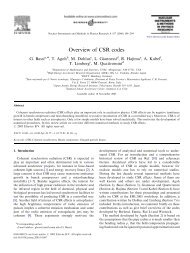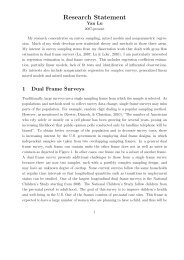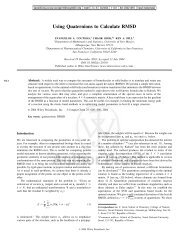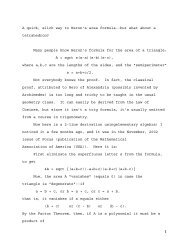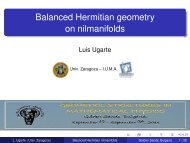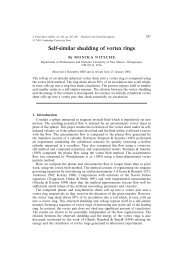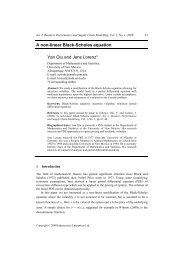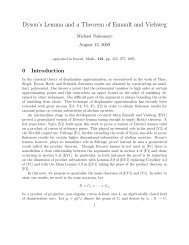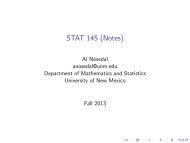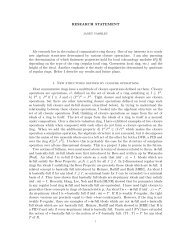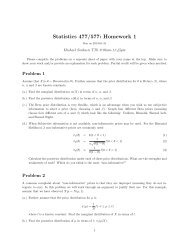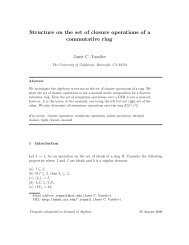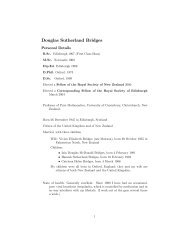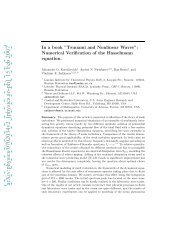OEO Office of Equal Opportunity - Department of Mathematics and ...
OEO Office of Equal Opportunity - Department of Mathematics and ...
OEO Office of Equal Opportunity - Department of Mathematics and ...
Create successful ePaper yourself
Turn your PDF publications into a flip-book with our unique Google optimized e-Paper software.
MATHEMATICS AND STATISTICS 249<br />
**318. Graph Theory. (3)<br />
Trees, connectivity, planarity, colorability, <strong>and</strong> digraphs; algorithms<br />
<strong>and</strong> models involving these concepts.<br />
Restriction: permission <strong>of</strong> instructor. {Spring}<br />
**319. Theory <strong>of</strong> Numbers. (3)<br />
Divisibility, congruences, primitive roots, quadratic residues,<br />
diophantine equations, continued fractions, partitions, number<br />
theoretic functions. {Spring}<br />
**321. Linear Algebra. (3) 1<br />
Linear transformations, matrices, eigenvalues <strong>and</strong> eigenvectors,<br />
inner product spaces.<br />
Prerequisite: 264. {Fall, Spring}<br />
322. Modern Algebra I. (3)<br />
Groups, rings, homomorphisms, permutation groups, quotient<br />
structure, ideal theory, fields.<br />
Prerequisite: 264. {Fall}<br />
**327. Introduction to Mathematical Thinking <strong>and</strong><br />
Discrete Structures. [Discrete Structures.] (3)<br />
Course will introduce students to the fundamentals <strong>of</strong> mathematical<br />
pro<strong>of</strong> in the context <strong>of</strong> discrete structures. Topics<br />
include logic, sets <strong>and</strong> relations, functions, integers, induction<br />
<strong>and</strong> recursion, counting, permutations <strong>and</strong> combinations <strong>and</strong><br />
algorithms. Students who do not have the prerequisite may<br />
seek permission <strong>of</strong> the instructor.<br />
Prerequisite: 162 <strong>and</strong> 163. (Fall)<br />
**412. Nonlinesar Dynamics <strong>and</strong> Chaos. (3)<br />
Qualitative study <strong>of</strong> linear <strong>and</strong> nonlinear ordinary differential<br />
equations <strong>and</strong> discrete time maps including stability analysis,<br />
bifucations, fractal structures <strong>and</strong> chaos; applications to biology,<br />
chemistry, physics <strong>and</strong> engineering.<br />
Prerequisites: 264 <strong>and</strong> 314 or 316.<br />
**415. [*415.] History <strong>and</strong> Philosophy <strong>of</strong> <strong>Mathematics</strong>.<br />
[Philosophy <strong>of</strong> <strong>Mathematics</strong>.] (3)<br />
(Also <strong>of</strong>fered as PHIL 415.) A historical survey <strong>of</strong> principal<br />
issues <strong>and</strong> controversies on the nature <strong>of</strong> mathematics.<br />
Emphasis varies from year to year. Student who does not<br />
have prerequisite may seek permission <strong>of</strong> instructor.<br />
Prerequisite: 356 or 456.<br />
*421. Modern Algebra II. (3)<br />
Theory <strong>of</strong> fields, algebraic field extensions <strong>and</strong> Galois theory<br />
for fields <strong>of</strong> characteristic zero.<br />
Prerequisite: 322 or 422. {Alternate Springs}<br />
**422. Modern Algebra for Engineers. (3)<br />
Groups, rings <strong>and</strong> fields. (This course will not be counted in<br />
the hours necessary for a mathematics major.)<br />
Prerequisite: 264. {Fall}<br />
*431. Introduction to Topology. (3)<br />
Metric spaces, topological spaces, continuity, algebraic topology.<br />
Prerequisite: 401. {Alternate Falls}<br />
ARTS AND<br />
SCIENCES<br />
**331. Survey <strong>of</strong> Geometry. (3)<br />
Topics from affine, projective, Euclidean <strong>and</strong> hyperbolic<br />
geometries.<br />
Prerequisites: 163 <strong>and</strong> (314 or 321). {Offered upon dem<strong>and</strong>}<br />
**356. [*356.] Symbolic Logic. (4)<br />
(Also <strong>of</strong>fered as PHIL 356.) This is a first course in logical<br />
theory. Its primary goal is to study the notion <strong>of</strong> logical<br />
entailment <strong>and</strong> related concepts, such as consistency <strong>and</strong><br />
contingency. Formal systems are developed to analyze these<br />
notions rigorously.<br />
**375. Introduction to Numerical Computing. (3)<br />
(Also <strong>of</strong>fered as CS 375.) An introductory course covering<br />
such topics as solution <strong>of</strong> linear <strong>and</strong> nonlinear equations;<br />
interpolation <strong>and</strong> approximation <strong>of</strong> functions, including<br />
splines; techniques for approximate differentiation <strong>and</strong> integration;<br />
solution <strong>of</strong> differential equations; familiarization with<br />
existing s<strong>of</strong>tware. {Fall, Spring}<br />
391. Advanced Undergraduate Honors Seminar. (1-3 to<br />
a maximum <strong>of</strong> 8) ∆<br />
Advanced problem solving. Especially recommended for<br />
students wishing to participate in the Putnam Intercollegiate<br />
Mathematical Competition.<br />
Restriction: permission <strong>of</strong> instructor. {Offered upon dem<strong>and</strong>}<br />
393. Topics in <strong>Mathematics</strong>. (3, no limit) ∆<br />
Selected topics from analysis, algebra, geometry, statistics,<br />
model building, interdisciplinary studies <strong>and</strong> problem solving.<br />
{Offered upon dem<strong>and</strong>}<br />
401./**501. Advanced Calculus I. (4)<br />
Rigorous treatment <strong>of</strong> calculus in one variable. Definition <strong>and</strong><br />
topology <strong>of</strong> real numbers, sequences, limits, functions, continuity,<br />
differentiation <strong>and</strong> integration. Students will learn how<br />
to read, underst<strong>and</strong> <strong>and</strong> construct mathematical pro<strong>of</strong>s.<br />
Prerequisite: 264 <strong>and</strong> two courses at the 300+ level. {Fall,<br />
Spring}<br />
434./534. Introduction to Differential Geometry. (3)<br />
Elementary theory <strong>of</strong> surfaces, differential forms, integral<br />
geometry <strong>and</strong> Riemannian geometry.<br />
Prerequisite: 311 or 402. {Offered upon dem<strong>and</strong>}<br />
**439. [*439.] Topics in <strong>Mathematics</strong>. (1-3, no limit) ∆<br />
{Offered upon dem<strong>and</strong>}<br />
441. [441./527.] Probability. (3)<br />
(Also <strong>of</strong>fered as STAT 461/561.) Mathematical models for<br />
r<strong>and</strong>om experiments, r<strong>and</strong>om variables, expectation. The<br />
common discrete <strong>and</strong> continuous distributions with application.<br />
Joint distributions, conditional probability <strong>and</strong> expectation,<br />
independence. Laws <strong>of</strong> large numbers <strong>and</strong> the central<br />
limit theorem. Moment generating functions.<br />
Prerequisite: 264. {Fall}<br />
462./512. Introduction to Ordinary Differential<br />
Equations. (3)<br />
Linear systems. Existence <strong>and</strong> uniqueness theorems, flows,<br />
linearized stability for critical points, stable manifold theorem.<br />
Gradient <strong>and</strong> Hamiltonian systems. Limit sets, attractors,<br />
periodic orbits, Floquet theory <strong>and</strong> the Poincare Map.<br />
Introduction to perturbation theory.<br />
Prerequisite: 314 or 321, 316, 401. {Fall}<br />
463./513. Introduction to Partial Differential Equations. (3)<br />
Classification <strong>of</strong> partial differential equations; properly posed<br />
problems; separation <strong>of</strong> variables, eigenfunctions <strong>and</strong><br />
Green’s functions; brief survey <strong>of</strong> numerical methods <strong>and</strong><br />
variational principles.<br />
Prerequisites: 312, 313, 314 or 321, one <strong>of</strong> 311 or 402.<br />
{Spring}<br />
464./514. Applied Matrix Theory. (3)<br />
Determinants; theory <strong>of</strong> linear equations; matrix analysis <strong>of</strong><br />
differential equations; eigenvalues, eigenvectors <strong>and</strong> canonical<br />
forms; variational principles; generalized inverses.<br />
Prerequisite: 314 or 321. {Fall}<br />
402./**502. Advanced Calculus II. (3)<br />
Generalization <strong>of</strong> 401/501 to several variables <strong>and</strong> metric<br />
spaces: sequences, limits, compactness <strong>and</strong> continuity on<br />
metric spaces; interchange <strong>of</strong> limit operations; series, power<br />
series; partial derivatives; fixed point, implicit <strong>and</strong> inverse<br />
function theorems; multiple integrals.<br />
Prerequisite: 401.<br />
*466. Mathematical Methods in Science <strong>and</strong><br />
Engineering. (3)<br />
Special functions <strong>and</strong> advanced mathematical methods<br />
for solving differential equations, difference equations <strong>and</strong><br />
integral equations.<br />
Prerequisites: 311, 312, 313, 316. {Spring}<br />
*471. Introduction to Scientific Computing. (3)<br />
(Also <strong>of</strong>fered as CS 471.) Introduction to scientific computing<br />
fundamentals, exposure to high performance programming<br />
language <strong>and</strong> scientific computing tools, case studies <strong>of</strong><br />
scientific problem solving techniques.<br />
UNM CATALOG 2006–2007 Symbols, page 611.



